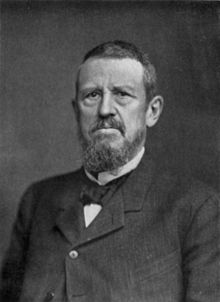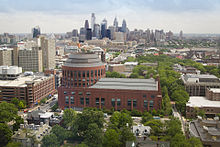Wharton School
At the graduate level, the Master of Business Administration program can be pursued by itself or along with dual studies leading to a joint degree from its law, engineering, and government schools.[7] Joseph Wharton, a native Philadelphian, was a leader in industrial metallurgy who built his fortune through the American Nickel Company and Bethlehem Steel Corporation."[8] From the founding of the school, he defined that its goal was "to provide for young men special means of training and of correct instruction in the knowledge and in the arts of modern Finance and Economy, both public and private, in order that, being well informed and free from delusions upon these important subjects, they may either serve the community skillfully as well as faithfully in offices of trust, or, remaining in private life, may prudently manage their own affairs and aid in maintaining sound financial morality: in short, to establish means for imparting a liberal education in all matters concerning Finance and Economy.[16] Wharton professor Simon Kuznets, who later won the Nobel Prize in Economics, created statistical data on national output, prices, investment, and capital stock and measured seasonability, cycles, and secular trends of these phenomena."[23][24] Wharton professor Paul Green is considered to be the "father of conjoint analysis" for his discovery of the statistical tool for quantification of market research.[26] Wharton professor Daniel M. McGill was widely regarded as the "dean of the pension industry,"[27] whose research contributed to shaping the modern retirement system both in the public and corporate sectors.[29] Wharton faculty began to work closely with AT&T, Merrill Lynch, MasterCard, Prudential Insurance, and the New York Stock Exchange in analyzing the strategic and commercial implications of information systems.After resigning from his law firm, he started pursuing a new career in business journalism and was promoted to the editor role of Bankers Magazine, a trade publication, in 1880.Upon joining the Wharton School, he began teaching business with classes on the law of governing finance and on the processes of commercial banking.One graduate, Shiro Shiba, returned to Japan where he would become a member of the Diet, the Japanese parliament, and another, Robert Adams Jr., later was named United States Ambassador to Brazil.Edmund J. James, with a doctorate from the University of Halle in Germany, reinvigorated the school's curriculum, starting classes on political finance and administration.He wanted to include training in banking, railroading, merchandising, manufacturing, and other similar branches, and expand the course's length to four years from the initial three.[51] In 2018, it was announced that a new 70,000-square-foot campus building for student entrepreneurship would be constructed, following a $25 million donation from the hedge fund manager and philanthropist Nicolai Tangen.[57] The legacy status of applicants, defined as having a parent or another direct relative who attended the same academic institution, may be considered in the admissions process.This correlation has been observed in a number of empirical studies conducted on the nation's most elite schools,[58] with a particular focus on Ivy League universities.[59] Leading universities in the United States cite stronger alumni connections and continued support as the primary reasons for this practice.In the 2015–16 school year, 334 employers participated in the on-campus recruiting process; each student received an average of 7.6 first-round interviews and 1.8 job offers.Wharton co-sponsored the Executive Master's in Technology Management Program (EMTM) with the University of Pennsylvania School of Engineering and Applied Science.[70] Wharton offers doctor of philosophy degrees in finance, applied economics, management, and other business fields (as opposed to some schools, which grant DBAs).Wharton also offers a dual master's degree in statistics and data science for students enrolled in other doctoral programs at the university.[84] Wharton School alumni include Tesla/SpaceX/Twitter CEO Elon Musk, U.S. president Donald Trump, investor Warren Buffett and financier Marc Rowan.




Privatebusiness schoolJoseph WhartonUniversity of PennsylvaniaEndowmentErika H. JamesUndergraduatesPostgraduatesPhiladelphiaPennsylvaniaIvy LeagueBethlehem SteelIvy League Business SchoolseconomicsMaster of Business AdministrationPhiladelphianmetallurgyBethlehem Steel CorporationSecond Industrial RevolutionESCP EuropeSimon Kuznetsgross national productgross domestic productLawrence KleinGeorge W. Taylorindustrial relationsmediatorarbitratorstrikesNew Yorkcivil servicecollective bargainingTaylor LawWroe AldersonSolomon S. Huebnertechnology managementMerrill LynchMasterCardPrudential InsuranceNew York Stock ExchangeRobert Adams Jr.United States Ambassador to BrazilEdmund J. JamesUniversity of HalleAlma K. LedigWorld War IIUniversity of Pennsylvania School of Arts and SciencesJon M. HuntsmanSaul SteinbergJoseph H. Lauder Institute for Management and International StudiesLeonard LauderRonald LauderNicolai TangenSan Francisco, Californiastart-upfinancing sectorSilicon ValleyWest Coastearly decisionlegacy statusfinanceaccountingfinancial servicesinvestment bankinginvestment managementprivate equitymanagement consultingLauder InstituteJohns Hopkins UniversityPaul H. Nitze School of Advanced International StudiesHarvard Kennedy SchoolHarvard UniversityINSEADFontainebleauSingaporeFinancial TimesLinkedInBloombergU.S. News & World Reportmassive open online coursesCourseraCOVID-19 pandemicList of Wharton School alumniWharton School alumniSpaceXTwitterElon MuskDonald TrumpWarren BuffettMarc RowanFortune 500Alphabet Inc.BoeingComcastGeneral ElectricJohnson & JohnsonOraclePfizerPepsiCoList of Wharton School facultyList of Ivy League business schoolsList of United States business school rankingsList of business schools in the United StatesOutline of organizational theoryPhilanthropy News DigestForbesThe Wall Street JournalBloomberg BusinessweekThe Daily PennsylvanianAlmanacEmory Richard JohnsonArts and SciencesCollegeCommunicationDental MedicineDesignEducationEngineering and Applied ScienceMedicineNursingSocial Policy and PracticeVeterinary MedicineAdvanced Judaic StudiesGovernmentGlobal Communication StudiesMediterranean Art and Archaeology